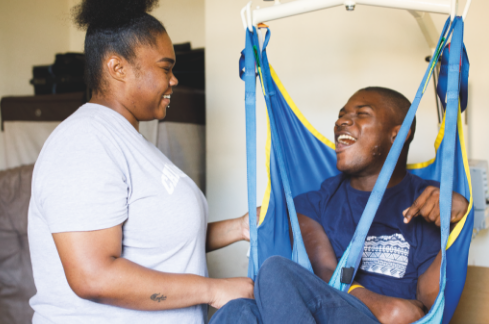Workforce
"As part of the record 36 billion investment to reform the NHS and social care, the Prime Minister’s announcement of at least £500 million funding for the care workforce across three years is very welcome", says Deborah Sturdy, Chief Nurse for Adult Social Care in her new blog marking the Prime Minister's recent announcement on …
The thought of receiving the COVID-19 vaccine was a little bit scary to begin with for Cygnet Healthcare's Raf Hamaiza. Like many others, he struggled to make sense of information pouring in from all directions. In this blog, he explains how he found clarity and peace of mind - for himself and his colleagues.
Kent County Council colleagues are really excited to be part of the workplace race equality standard (WRES). They believe it can lead to greater representation of people from different ethnic backgrounds in leadership positions, and, more broadly, enhance career development opportunities at all levels.
Developed by the NHS and then adapted for use in social care, a new infection prevention control toolkit has been launched to help all social care colleagues protect themselves and those they care for. It can be used to start a conversation and help you find the answer to the question: ‘What can I do …
In February 2021, the Commission on the Role of Housing in the Future of Care and Support published its first report – a policy discussion paper outlining the major issues facing accommodation provision for older people and setting out a vision for a better future, with some preliminary proposals the Commission had been exploring as …
Deborah Sturdy is delighted to announce the launch of the first ever Chief Nurse Adult Social Care Awards, rewarding the significant and outstanding contribution made by care workers and nurses in England. Find out how you can nominate the great and the good of social care.
Bristol Council's Principal Social Workers are very pleased to be taking part in the Workforce Race and Equality Standard (WRES) national pilot for which there has been strong support from colleagues. They see this as an opportunity to share learning from their collective experiences and help drive organisational change.
Making sure the voices of staff from all ethnic backgrounds are heard are central to the objectives of the Workplace Race Equality Standard (WRES). In our first in a dedicated series of blogs, Brighton & Hove City Council’s Principal Social Workers Richard Cattell and Tom Stibbs reflect on challenges within their organisation, how the WRES …
"March has been the month when women’s contribution to the health, wealth and prosperity of our world has been emphatically celebrated. We want to tap into this rich resource of skills, empathy and lived experience" says Deborah Sturdy, Chief Nurse for Adult Social Care. "Earlier this month, we launched a consultation to inform a new …
"When the pandemic first hit... everyone’s lives changed. It felt scary, especially so for staff in our care homes who provide 24 hour support to people with learning disabilities. In an effort to help everyone understand what coronavirus was, we got creative. Using arts and crafts we made signs to remind everyone to wash their …









